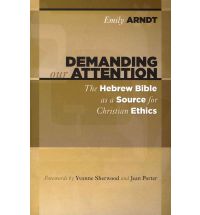Anne Barnhill, a poet and novelist who often reviews books for this blog and in other forums, offers this note to readers:
In more than 20 years of reviewing books, I have tried to maintain a certain objectivity. I may review books of acquaintances, but I do not let those ties cloud my interpretation of the book itself. Usually, I would excuse myself from reviewing a book by a dear friend or family member. This is one exception. On Dec. 1, 2007, my beloved daughter-in-law, Emily K. Arndt, passed away. She left behind her husband and two small children. She also left this book. Linda Brinson has kindly allowed me to honor Emily by writing a review of her book. I do not promise objectivity, but I will promise a careful and engaged reading of the text, something I hope will be pleasing to Emily.
By Anne Barnhill
DEMANDING OUR ATTENTION: The Hebrew Bible as a Source for Christian Ethics.
By Dr. Emily K. Arndt. Wm. B. Eerdmans Publishing Co. 190 pages, paperback.
 Emily K. Arndt’s first book, Demanding Our Attention: The Hebrew Bible as a Source for Christian Ethics, is a scholarly discussion of how we can approach stories in the Hebrew Bible that seem to contradict what we understand about living ethically, stories that challenge us to comprehend their meaning in the 21st century, stories we struggle to integrate into our religious lives. Arndt makes the case for taking the Hebrew Bible seriously ethically and morally, rather than discarding it as no longer relevant to us. As her example story, she uses the binding of Isaac from Genesis 22, or the Akedah.
Emily K. Arndt’s first book, Demanding Our Attention: The Hebrew Bible as a Source for Christian Ethics, is a scholarly discussion of how we can approach stories in the Hebrew Bible that seem to contradict what we understand about living ethically, stories that challenge us to comprehend their meaning in the 21st century, stories we struggle to integrate into our religious lives. Arndt makes the case for taking the Hebrew Bible seriously ethically and morally, rather than discarding it as no longer relevant to us. As her example story, she uses the binding of Isaac from Genesis 22, or the Akedah.
Reading any book from the fields of academia can be daunting, especially if the area is unfamiliar. This book is difficult in places, especially for those readers who are ignorant about the works Arndt is discussing. However, the reader is well rewarded as Arndt weaves these varying approaches to the Akedah into her own argument for approaching the Hebrew Bible with some of the tools of literary criticism, particularly the “reader response” idea that the reader brings her own set of assumptions and biases to the text, and only a “self-aware” reader can move beyond these to approach the text in a more genuine way.
By using interpretations of the Akedah from Kierkegaard to Philip the Chancellor to Genesis Rabbah to modern scholars, Arndt studies each, placing them side by side in the rabbinical tradition, to extract and discuss the relevance of this difficult story. After studying these arguments in great detail, Arndt avoids any definitive conclusions. Instead, in what I think is one of her most important ideas, she says:
In continuing to engage (and be engaged by) the biblical text, the aim is not a perfect interpretation or an articulation of the right “ethic’ but rather participation in an ongoing relationship.
Theologian Jean Porter gives this estimation of Arndt’s contribution to her field: “This is a fully formed, sophisticated and beautifully written book, offering an important contribution to the field of theological ethics.”
Dr. Yvonne Sherwood adds, “I will go on turning it and turning it and reflecting on its implications for my own work for many years to come.”
Establishing an ongoing relationship with the Hebrew Bible as a genuine source for ethical development, though the text is often alien or “other,” enables us to question our own assumptions when dealing with those in our lives whom we consider “other.” By such careful reading, we must return again and again as we struggle with meaning – a lot like the way we wrestle over and over with a God who transcends our mortal and moral understanding.